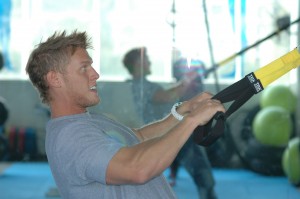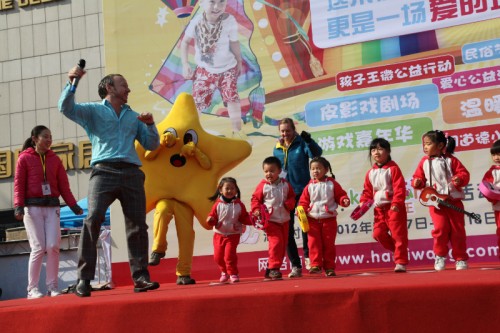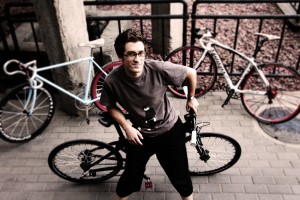![]() John Graham Harper crouches in his gym in southern China, bending his muscled legs and concentrating. Then he leaps up, using the power in his thighs and calves to shoot him up in a tremendous bounce. He lands neatly on a waist-high structure, an impressive feat. “It’s all in the explosive force,” he says with a grin. Like thousands of other Australians, John has hooked into the sheer strength of China’s economy. He first arrived in Shenzhen, the powerhouse of southern China, more than 14 years ago. Now he and a partner own and run Fusion Fitness in the Shekou district (www.fusionfitnesssz.com). The gym is doing well, with more than 400 members, and these fitness entrepreneurs will soon open a second gym in Futian, some twenty kilometres to the east.
John Graham Harper crouches in his gym in southern China, bending his muscled legs and concentrating. Then he leaps up, using the power in his thighs and calves to shoot him up in a tremendous bounce. He lands neatly on a waist-high structure, an impressive feat. “It’s all in the explosive force,” he says with a grin. Like thousands of other Australians, John has hooked into the sheer strength of China’s economy. He first arrived in Shenzhen, the powerhouse of southern China, more than 14 years ago. Now he and a partner own and run Fusion Fitness in the Shekou district (www.fusionfitnesssz.com). The gym is doing well, with more than 400 members, and these fitness entrepreneurs will soon open a second gym in Futian, some twenty kilometres to the east.
“After being here for so long, I’m not in any way settled,” says the 27-year-old Queenslander, who says he now speaks “rockin’ Chinese”. “I haven’t bought a property. I’m here for the business potential.”
Personal trainers, chefs, teachers, accountants, students, bankers, entrepreneurs, diplomats, musicians: Australians have a big presence in China. And the numbers are likely to keep growing as the ascendant nation edges past the US to become the world’s economic super-power. Once Chinese fortune-hunters flocked to Australia’s goldfields to try their luck. These days a growing band of Australians can see gold in China’s rapidly developing market of nearly 1.4 billion people.
China’s National Bureau of Statistics estimates that in 2010 more than 13,000 Australians – and more than 60,000 foreigners in total — were living in mainland China.
These expatriate Australians have adapted to the very different culture of China, where city air can be almost unbreathable, where the ever-watchful government routinely censors social media; where celebrities are invited to “drink tea” with a garnish of interrogation if they step out of line; and where human rights activists have been locked up for years without redress.
But it’s also a nation of endless generosity, where packets of cigarettes, or even loose cigarettes, are pressed on visitors as gifts, regardless of whether the visitors smoke or not; and where a waitress, who earns pennies for long hours of hard labour, races after a foreigner to give back a tip that she assumes has been carelessly left behind, and where Chinese donations paid for an American to have a brain tumour removed.
It’s a nation that works on “guanxi” — networks of friends, relations, associates and other social connections, and it can be an alien land for a newly-arrived Australian. Some Australians do very well in China, like the successful Melbourne-born restaurateur Michelle Garnault, whose upscale M restaurants in Shanghai and Beijing are enjoyed by those cities’ elites. But some do it tough, like the Australian-born businessman of Chinese origin, Stern Hu, who was sentenced to ten years in prison in 2010 for receiving bribes and stealing commercial secrets.
There is a shining thread that links expatriate Australians and keeps them working in China: they have moved to the once-isolated Middle Kingdom to take the chance of doing well. And doing well in China can mean doing very well indeed.
Still, no matter how well they are doing, these Australians miss the parks and beaches, and the clean air of Australia. Outside John’s gym, the sun is shining and the waters of the South China sea are glittering. But an ominous fug hangs in the air – pollution from thousands of factories stretching northwards and belching fumes, and from China’s love affair with the car. In the nation’s capital Beijing in early January the pollution sat on the city in a thick and evil toxic cloud. It reached hazardous levels, and residents were warned not to spend too much time outdoors.
“It’s not that bad here usually,” John says ruefully. “But it’s true, I get off the plane in Sydney and I get a head-buzz. The oxygen levels in Sydney give me a head buzz. I don’t appreciate the smog that Shenzhen has.” Still, with the rush of opening another gym and expanding his business, John is doing his best to ignore the pollution.
Amiel Rabbelier, from Sydney’s eastern suburbs, is another Australian who misses the clear skies of his home. Now aged 31, he has lived in China “on and off” for the last 11 years, and he’s been based in the northern city of Nanjing for the past four.
“Right now, looking out the window, I can’t see the buildings more than about one kilometre away,” he says with a sigh.
Like many of the Australians living in China, Amiel works in the field of education. He set up the Superstar Kindy in Nanjing in 2010 (www.superstarkindy.com), and he says the operation is now doing well. Open seven days a week, the kindergarten employs expatriates who teach English, history, geography and maths.
“For now it’s a business decision,” he says. “If this (the kindergarten) wasn’t here, we’d probably be in Australia. First and foremost, I don’t think we can have the same lifestyle here, the life with parks and beaches. A lot of it comes down to pollution.” And with 17-month-old twins (a boy and a girl), he is concerned about the health hazards.
Ami concedes he and his wife, who’s a Nanjing city councillor, employ three housekeepers — servants who eliminate much of the drudgery from everyday life.
But the most important advantage is the potential to do well financially. China, Ami believes, has enormous economic potential. “The thing is here, it’s always growing; it’s one of the advantages. China hasn’t been affected so much by the economic downturn.”
Like Ami, Shannon Bufton is in China for the long term. Originally from Geelong, outside Melbourne, he has spent a total of six years in China, beginning as an urban planner in the important northern city of Shanghai. “After being involved at a pretty high level for a number of years,” the 36-year-old says, “I realised that the ideas you grow up with, architecture and urban planning, for better cities and to make the planet more sustainable, really get lost here in China.”
So Shannon and his wife, who is from Beijing, decided to try and make a difference at ground level. The push-bike level.
In 2009, they launched “Smarter Than Car”, a movement to get pushbikes back on the streets of Chinese cities, with a website to promote the idea (www.stcbj.com/en). Shannon is a passionate cyclist. He rode a bike to school in Geelong and a bike all round Melbourne when he was at university.
Sadly, at the moment China isn’t very interested in the movement to get bikes back on the road. There were are pressing problems, Shannon was told, like dealing with the problem of water quality. So he and his wife opened Serk, a hybrid café, bike shop and cycling promotion business (www.serk.cc). Cycling, of course, usually needs clean air, and Beijing’s pollution even gets Shannon off his bike sometimes, although he is unfazed by the city’s winter temperatures, which are often well below freezing. Biking, he hopes, will make a comeback, and Shannon and his wife will be there when it does.
“I think we’re here for the long term,” he says. “We get out to the mountains and ride in good quality air as often as we can, at least once a week. But the air is always a consideration here.”
Like Shannon, Tracey Redshaw is a long-term China resident. Originally from Wahroongah in Sydney’s northern suburbs, she and her husband moved to the massive southern city of Guangzhou ten years ago, when she was 22.
As a blonde, Tracey attracts a lot of attention, and she speaks Mandarin so she knows exactly what is being said about her. But she says she usually lets the comments slide, regardless of whether they’re positive or negative.
Like many Australians, she enjoys a good meat pie and sausage roll, and it was a sudden yearning for the staples of Aussie takeaway that fired her decision to set up the Boomerang Bakery in Guangzhou (www.boomerangbakery.com.cn). Tracey and her business partner, a fellow Australian, worked out the pros and cons, drew up a business plan, and opened on Australia Day, 2010. Now the operation has two retail premises as well as the baking operation, employs 34 staff, and sells an array of pies, sausage rolls, chocolate éclairs, cupcakes, caramel slices and – of course – lamingtons to their customers, both expatriate and Chinese. There are also sales to other commercial operations in China.
But living in another country means there are always difficulties. Tracey remembers an experiment that demonstrated the difference in cultures, and the practical nature of non-hostile racism in Chinese society. Her father was staying with her. He speaks no Chinese and he went to buy lilies in the market, where he was charged an extortionate price. Tracey went to the market, speaking fluent Chinese, and the price was lower. Her Chinese assistant went, and the price was different again – the lowest of the three.
“I miss a lot of things about living in Australia, the ease of doing things, as simple as driving to the grocery store, and being able to read what’s going on in your community,” Tracey says. “Quite often the roads here are closed and unless I ask someone I never know why.”
This latest band of adventurous Australians to live in China follow in the footsteps of a small army of bold and inspired individuals, dating back to the 1800s, people who were spurred by religious fervour, greed, or sheer curiosity.
Back in the 1840s or so, Australian squatters hired thousands of Chinese labourers from Amoy (modern-day Xiamen, on the Chinese coast opposite Taiwan). This “coolie” labour, as it was known then, consisted exclusively of Chinese men, hired to work as shepherds out in the lonely stretches of Australia. The squatters, or their Australian agents, may have gone to China to oversee the recruitment, and could well have been the first Australians to work in the Middle Kingdom. They were followed by Australian entrepreneurs, journalists and missionaries, and these last frequently risked their lives in their quest to spread the word.
These days, Australians in China are more likely to go to an AFL match than take a risk on intrepid journeys into the unknown. Jon Hopper, who works for a large footwear manufacturer in southern China, is the president of the ever-hopeful Guangzhou Scorpions (www.guangzhouscorpions.com). An ardent Swans fan from Sydney’s Dulwich Hill, Jon says when the call went out for a volunteer president for the AFL team, he was “the stupid guy who got left at the front when everyone took a step backwards”.
A long-term resident of China, the 45-year-old says he is often still mystified by the workings of his host nation. “There’s a certain lack of logic in China,” he says. “I don’t think it matters how long you stay in China you never really understand why some things happen and some things don’t.” He and his wife enjoy the wealthy expatriate life, with servants to do the housework, but he notes that’s not unique to China. And, he says a little wistfully, if he could get a comparable job, it’s likely he and his wife would return to Sydney.
Kain Picken is still getting used to life in China. The 32-year-old fashion designer and artist, originally from Broken Hill in western NSW, has lived and worked in Shenzhen, in southern China, for more than a year now. He and his partner, Fiona Lau, employ about ten people to produce garments for their ffiXXed collection (www.ffixxed.com), which is sold in boutiques around the world.
With a studio in Wutong Mountain, on the outskirts of Shenzhen, Kain and Fiona spend nearly all their time working. There have been disconcerting brushes with officialdom. When the University Games were held in Shenzhen in 2011, bureaucrats turned up, wielding cameras and pens and told the couple they had to leave, move out, within two days. “So we had to go,” Kain remembers. “It was quite stressful at the time.” But they went on to find a better place, and they really like the ease of producing in the go-ahead nation. “I can’t see us moving our production out of China”.
For many Australians, China is the land of opportunity, where hard work, determination and clear thinking can pay rich dividends. John Graham Harper, fitness impresario, is a believer. He’s in China with an eye to the future, and three of his brothers are also living in the giant nation. One works with him in the gym, one is a student and one deals in wine.
“We have to see the future, the business potential, it’s all about seeing the business potential,” he says. “The numbers are on your side here.”


